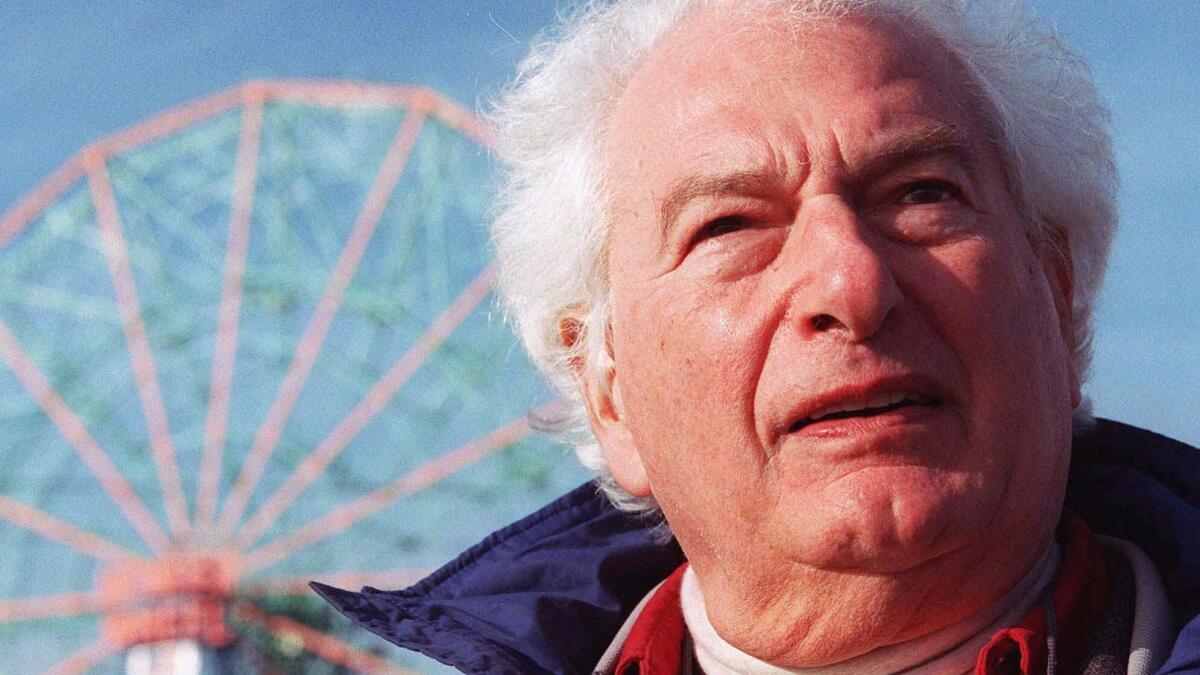Why Joseph Heller’s ‘Catch-22’ is a relevant antiwar satire in the age of Trump
America’s wars are scattered with the brave, rabid and opportunistic.
From Vietnam to Iraq, the toll of conflict has taught us that leaders will lie, false heroes will be exalted, corporations will reap hundreds of billions of dollars in contracts, and those who protest the horror and farce of unfolding bloodshed will be stamped unpatriotic and sent on their way so as not to disturb the flag-draped reverie.
That is the essence of Joseph Heller’s 1961 masterwork “Catch-22,” a novel set in World War II that stripped away the glory of battle through conniving, clueless and scary characters that would symbolize the misadventures of future wars. With President Trump threatening Iran and North Korea testing missiles, Heller’s book, an allegory for life’s mayhem, is as prescient today as when it was published at the threshold of America’s foray into Vietnam.
“The novel is an incredibly, beautiful, hilarious, moving satire about the insanity of war,” says novelist, poet and screenwriter Luke Davies (“Lion,” “Candy”), who adapted the story for Hulu’s new miniseries “Catch-22,” co-directed by and starring George Clooney. “Heller was so on the mark in his gloriously acidic comedic portrayals of those in positions of power. The very people having the least skills to lead us become the ones in charge. But the story is really one man’s journey of loss.”
That man — whose fate has been taught in countless English classes — is Capt. John Yossarian. He’s a bombardier who sees the futility of war after flying 50 missions over Europe. He yearns to go home. But he faces the famous Catch-22 conundrum: A man is considered insane if he wants to fly more missions, but the rules say he can’t be pulled from duty unless he asks to be grounded; yet if he requests to stop, he is considered rational and fit to fight. There is no escape. The madmen colonels and vainglorious generals have him trapped in a crazy, confusing labyrinth.
The novel is an incredibly, beautiful, hilarious, moving satire about the insanity of war
— Luke Davies, poet, novelist, screenwriter
The power of “Catch-22” is in the play of its language, which turns war into a grotesque cartoon of pointless carnage. It, like Kurt Vonnegut’s anti-war “Slaughterhouse-Five,” published eight years later in 1969, would shape a skeptical generation no longer bound to the World War II ethos and unquestioned patriotism of its parents. It was literature speaking to an era of change.
The novel’s dark, absurdist style would be adapted for a 1970 film by Mike Nichols. The book would inform later TV shows and movies, including “MASH,” “Apocalypse Now,” “Three Kings” and “Generation Kill.” Echoes of “Catch-22” also run through acclaimed novels from the Iraq war, notably “Billy Lynn’s Long Halftime Walk” and last year’s “Frankenstein in Baghdad.” Each work contains slivers of truth that glimmer in a wider surrealism about the reach and consequence of war.
Today, though, the shock and awe of conflict has turned into ambivalence, an inured sense, such as in Afghanistan, that while our wars grind on in foreign lands, Americans blithely go about their lives at home. Heller’s novel captures this feeling of the abstract. War exists in a perverse parallel universe that reflects and caricatures the government and bureaucracy that unleash it and manipulate public opinion around it.
Mirror of distorted facts
“Catch-22” was written when the U.S. was ascendant and Washington was viewed by much of the world as a benevolent power. But American hubris would lead to cynicism, which Heller captures so well, over the nation’s ideals and its designs both at home and abroad. The novel understands that goodwill — whether in one’s soul, politics or army — spoils when true intentions come to light and those who plot from the shadows are exposed.
The term “Catch-22” became part of the American vernacular, shorthand for ludicrous and contradictory undertakings. At once comic and tragic, the novel mirrored what was to come, including the inflated enemy body counts and White House lies of Vietnam. Moments in the Iraq war seemed as though they had been scripted by Heller: President George W. Bush landing on an aircraft carrier in 2003 and proclaiming “Mission Accomplished” in a conflict that would drag on for eight more years and cost more than 400,000 lives.
Secretary of Defense Donald Rumsfeld channeled the inscrutable logic of “Catch-22’s” military officers when he gave this assessment of the unfolding Iraq war: “There are known knowns; there are things we know we know. We also know there are known unknowns; that is to say we know there are some things we do not know.”
More recently, President Trump’s tweets directed at a certain Asian despot almost mimic Heller. “North Korean leader Kim Jong Un just stated that the ‘Nuclear Button is on his desk at all times.’ Will someone from his depleted and food starved regime please inform him that I too have a Nuclear Button, but it is a much bigger & more powerful one than his, and my Button works!”
Trump would later switch tactics and say of his nemesis: “We fell in love …. He wrote me beautiful letters.”
The name that would come to define the American paradox happened by chance. “Catch-22,” which received mixed reviews, was originally called “Catch-18.” Heller changed the title of his debut after he was informed that bestselling author Leon Uris’ next book was “Mila 18.” The switch became instant publishing folklore, an irony worthy of Yossarian and his fellow flyboys. The son of a truck driver born in Coney Island, N.Y., Heller would go on to write other novels and plays, but none caught the cultural zeitgeist like “Catch-22.”
One of book’s most indelible characters is Milo Minderbinder, a wheeling-dealing mess officer and unabashed capitalist, who flies around Europe trading in black-market cotton, dates, zinc, M&Ms and oranges. His is the fictional precursor to military contracting firms such as Halliburton and Blackwater. Milo makes soldiers believe they are shareholders in a vast corporation that can profit from war without becoming distracted by morality.
Milo had flown “fearlessly into danger and criticism by selling petroleum and ball bearings to Germany to make a good profit and maintain a balance of power between the contending forces,” Heller writes. “His nerve under fire was graceful and infinite. With a devotion to purpose above and beyond the line of duty, he had then raised the price of food in his mess halls so high that all officers and enlisted men had to turn over all their pay to him in order to eat.”
The rock and roll of novels
Others writers concerned with war and unchecked American power took notice. Heller is carrying “his reader on a more consistent voyage through Hell than any American writer before him,” wrote Norman Mailer in a 1963 review. “It’s the rock and roll of novels.”

Parts of “Catch-22” have not aged well. The humor at times feels dated, repetitive and over the top. The novel’s misogyny — women are objectified and sexualized — sketches a pre-feminist view of a world run by men who celebrated a band-of-brothers mentality. If Heller, a bombardier in World War II who died in 1999, had published “Catch-22” in the post #MeToo era, his editor would likely have suggested a bit more enlightenment.
Novelist Susan Straight, who teaches a fiction class on war and love at UC Riverside, remembers being angered at the book’s treatment of women when she first read the novel decades ago. “ ‘Catch 22’ is a reminder that women writers who came of age in the 1960s and ’70s were told that the ‘spirit guides’ to the world of fiction and narrative were masculine novelists like Mailer, Ernest Hemingway and Joseph Conrad.
“Even with most minor male characters in ‘Catch 22,’ I can see their baggy trousers, droopy mustaches or their hands,” says Straight. “What I don’t see is the wrist of that poor nurse who takes everyone’s temperature. I never see her shoulder or whether her ankles were swollen from walking. Instead, Yossarian puts a hand up her skirt and another guy grabs her bosoms. And I thought, why is this all she gets? She never gets to have the moment when she turns her head to look at someone’s thermometer reading and you can see the curve of her eyebrow. That’s all I wanted.”
Straight’s memoir “In the Country of Women,” which will be published later this year, reflects in part on women in her family who endured their own private battles. “I’m writing about the women who fled all the men who had been in war,” she says. “My ancestors survived the men who survived the cannons and they were terrible men.”
The officers and soldiers in “Catch-22” are a kaleidoscope of delusion, ego, incompetence, lunacy and the dizzying agendas that veer through folly and fury. The chaplain lacks “ecclesiastical aplomb.” The doctor is a brooding hypochondriac; a lieutenant’s cheeks shake “with gusts of anguish.” The daring yet insecure Col. Cathcart oozes with conceit and endless schemes to impress his superiors. And Capt. Black wants his men to swear loyalty oaths before meals.
The loyalty-oath passage reminds Davies of when Trump, shortly after taking office, nodded around the table in the White House while each member of his Cabinet praised him.
“When Trump started corralling his inner Cabinet during that press conference,” says Davies, “it was a hilarious theater of fear and oppression, and a kind of fascism in action. If Heller had been alive and writing this now, Trump would have infused his consciousness.”
The deaths of men in “Catch-22” accumulate — sometimes with a passing sentence, other times in recurring coda. They haunt the novel, emblems of the waste men do to other men. Yossarian wants no part of it. He schemes, fakes injuries and illness; appears crazy then lucid, threatens and undermines his superiors, whom he believes are a bigger danger to him than the Germans. There’s no way out. Until that day he spies an epiphany.
“There’s nothing negative about running away to save my life.”
Twitter: @JeffreyLAT
More to Read
The complete guide to home viewing
Get Screen Gab for everything about the TV shows and streaming movies everyone’s talking about.
You may occasionally receive promotional content from the Los Angeles Times.







